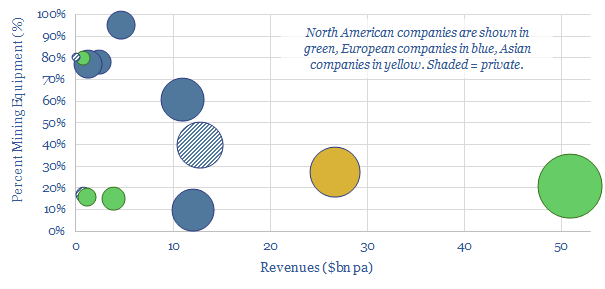Search results for: “"fuel cell"”
-
Energy transition stocks: holdings in clean energy funds?
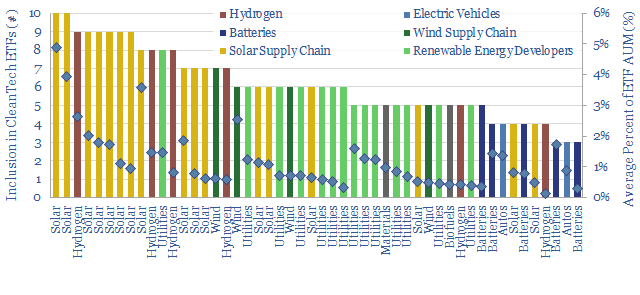
Which stocks are most considered to be energy transition stocks? To answer this question, we have aggregated the holdings of ten well-known energy transition ETFs and clean tech ETFs, in early 2023.
-
Carbon capture and storage: research conclusions?
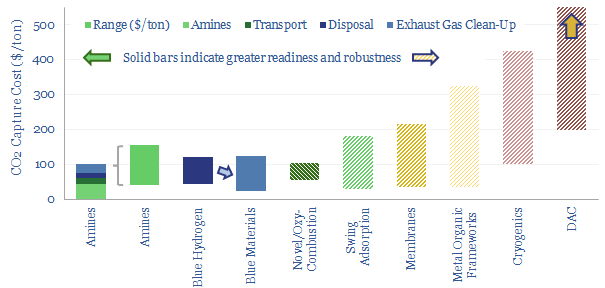
Carbon capture and storage (CCS) prevents CO2 from entering the atmosphere. Options include the amine process, blue hydrogen, novel combustion technologies and cutting edge sorbents and membranes. Total CCS costs range from $80-130/ton, while blue value chains seem to be accelerating rapidly in the US. This article summarizes the top conclusions from our carbon capture…
-
Gas generation: what kind of bear is best?
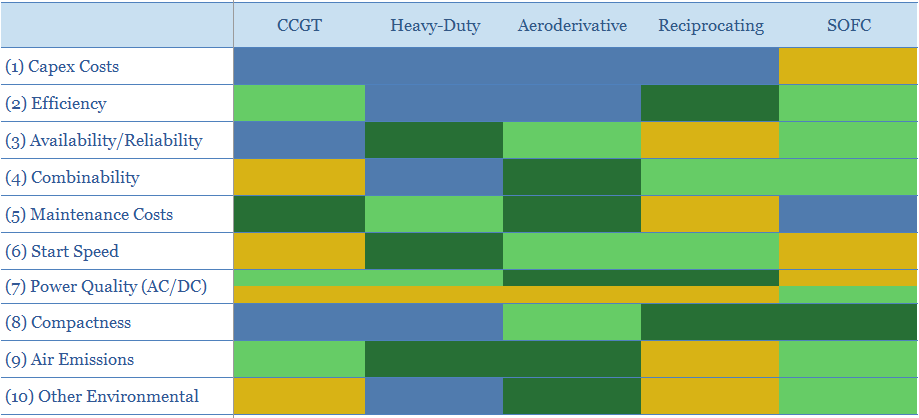
This 17-page report compares combined cycle gas turbines (CCGTs), heavy-duty gas turbines, aeroderivative gas turbines, reciprocating engines and solid oxide fuel cells (SOFCs), on ten dimensions. No one gas generation technology is best. But modular solutions may increasingly rival CCGTs, especially for energizing AI data-centers?
-
Power plants: average capacity?
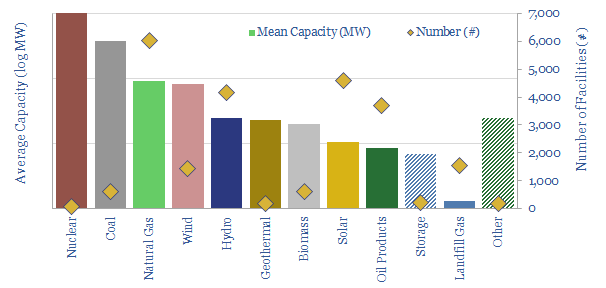
This data-file aggregates granular data into the average capacity of different types of power plants: wind, solar, nuclear, gas, hydro, coal, biomass, landfill gas and geothermal. Energy transition is going to increase the number of inter-connections to the grid by 10-100x.
-
Energy costs of energy transition?
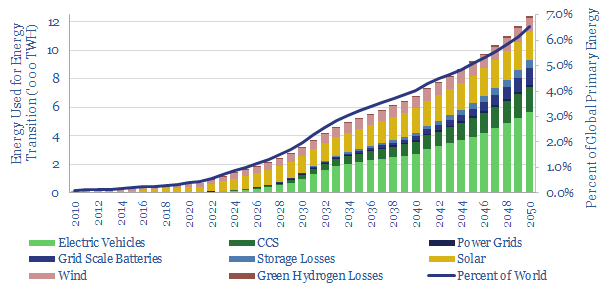
Reaching net zero requires building wind, solar, grid infrastructure, energy storage, EVs and capturing CO2. Thus the total energy costs of energy transition reach 1% of total global primary energy in 2025, 2% in 2030, 4% in 2040 and 6.5% in 2050. Energy transition is materially easier to achieve from a period of energy surplus.
-
Natural gas: the EU green taxonomy’s 270g/kWh CO2 target?
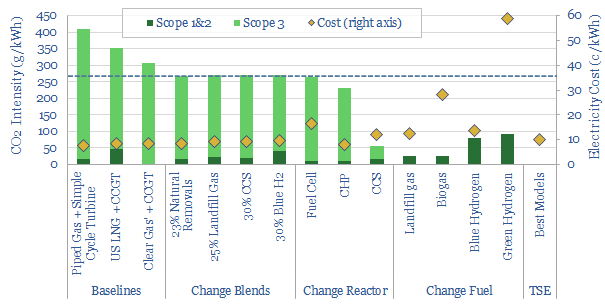
The EU taxonomy is a set of guidelines that label some investments as ‘green’. This includes gas power with a CO2 intensity below 270g/kWh. Most conventional gas projects will not meet this hurdle, but CHPs and 20-30% blends of lower-carbon gas could accelerate.
-
Absorption chillers: the economics?
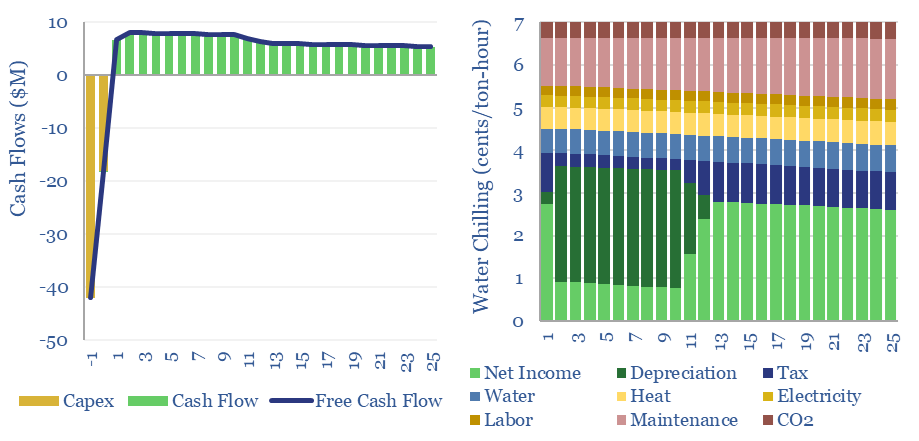
Absorption chillers perform the thermodynamic alchemy of converting waste heat into coolness. Capex costs of absorption chillers average $600/kW-th and all-in absorption chiller costs run to 6-7 cents/ton-hour, depending on the price of incoming waste heat. This data-file captures the economics of absorption chillers from first principles.
-
Turbo-charge gas turbines: the economics?
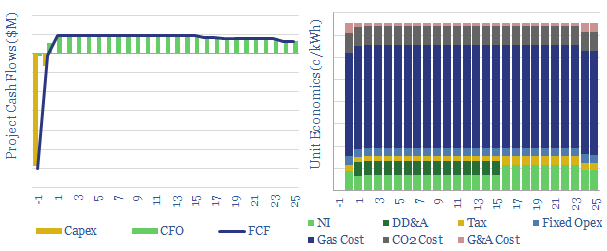
This data-file models the economics of turbo-charging gas turbines, which increases the mass flow of combustion air, to improve their power ratings by c10-20%. IRRs are solid. Turbo-charged gas turbines could thus gain greater share as grids become saturated with renewables
-
CO2 Storage: the top ten challenges in CCS?
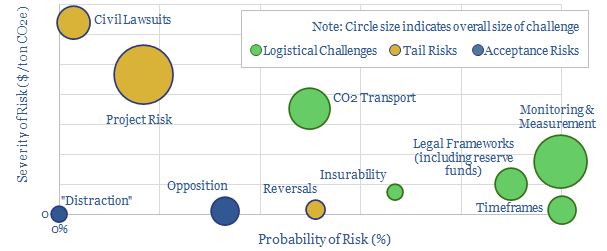
This data-file tabulates the “top ten” challenges for geological storage of CO2, based on reviewing the technical literature. There is c$8-30/ton of tail-risk for a typical CO2 storage operation. 25 monitoring and measurement technologies are summarized. We conclude CCS is no ‘less risky’ than nature based solutions to climate change.
Content by Category
- Batteries (89)
- Biofuels (44)
- Carbon Intensity (49)
- CCS (63)
- CO2 Removals (9)
- Coal (38)
- Company Diligence (94)
- Data Models (838)
- Decarbonization (160)
- Demand (110)
- Digital (59)
- Downstream (44)
- Economic Model (204)
- Energy Efficiency (75)
- Hydrogen (63)
- Industry Data (279)
- LNG (48)
- Materials (82)
- Metals (80)
- Midstream (43)
- Natural Gas (148)
- Nature (76)
- Nuclear (23)
- Oil (164)
- Patents (38)
- Plastics (44)
- Power Grids (130)
- Renewables (149)
- Screen (117)
- Semiconductors (32)
- Shale (51)
- Solar (68)
- Supply-Demand (45)
- Vehicles (90)
- Wind (44)
- Written Research (354)
